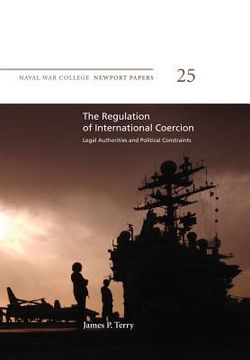The Regulation of International Coercion: Legal Authorities and Political Constraints: Naval War College Newport Papers 25 (in English)
Synopsis "The Regulation of International Coercion: Legal Authorities and Political Constraints: Naval War College Newport Papers 25 (in English)"
The study of international law has been an element of the curriculum of the Naval War College since the founding of the College, and it was to fill the need for textbooks focusing on practical, law-related naval issues that the College published its first book, in 1895. That work-a collection of edited and expanded lectures given in Newport by Freeman Snow, professor of international law at Harvard, published as International Law: A Manual Based upon Lectures Delivered at the Naval War College-was seminal in two ways. First, it was for its compiler, Commander Charles Stockton of the Naval War College's faculty, that the College's prestigious chair in international law is named. Second, the book itself, which was soon canonical, was the forerunner of the International Law Series, of which seventy-nine volumes by, or collecting the work of, major scholars have appeared, with more in preparation. The Naval War College Review in its time took up the challenge. In the May 1949 issue (Information Service for Officers, as it was first known, having been founded only in October 1948), its editors published "Legal Foundations of International Relations," by Manley O. Hudson. At this writing, the index of the journal contains seventy-one entries under the heading "International Law," and the continual flow of manuscripts from international lawyers testifies that the Review is well established in that field. It is no surprise, then, that when the Naval War College Press established the Newport Papers monograph series in the early 1990s, international law quickly found a place there. The third Newport Paper, published in October 1992, was Horace B. Robertson, Jr.'s, The "New" Law of the Sea and the Law of Armed Conflict at Sea; the eleventh, by Frank Gibson Goldman, was The International Legal Ramifications of United States Counter-Proliferation Strategy: Problems and Prospects (April 1997), and number fifteen was International Law and Naval War: The Effect of Marine Safety and Pollution Conventions during International Armed Conflict, by Dr. Sonja Ann Jozef Boelaert-Suominen (December 2000). So it is with particular satisfaction that we sustain that commitment with this Newport Paper, the twenty-fifth in the series, and the first of our 2006 program. James P. Terry-a former Principal Deputy Assistant Secretary and Deputy Assistant Secretary of State; former legal counsel to the chairman of the Joint Chiefs of Staff, then General Colin Powell; a retired colonel, U.S. Marine Corps; and today chairman of the Board of Veterans' Appeals, in the Department of Veterans Affairs-is familiar to Press subscribers as the author of four articles (going back to 1986) in the Review. In The Regulation of International Coercion Colonel Terry has undertaken a major task, an assessment-from a U.S. policy perspective and in an international-law framework-of "representative instances where force has recently been used in international relations, the circumstances under which it was used, the instructive international policy and legal constructs that can be applied, and the relationship of these policies to the minimum world order system established in . . . the United Nations Charter." He is eminently fitted to meet the challenge, and the value of his argument befits the century long tradition of publishing in international law at the Naval War College.

